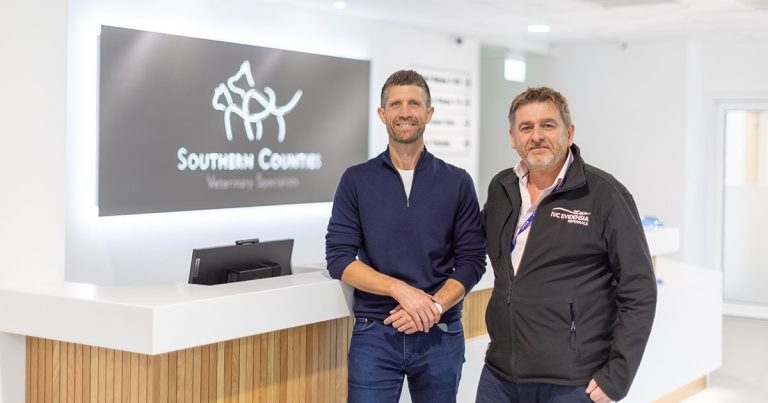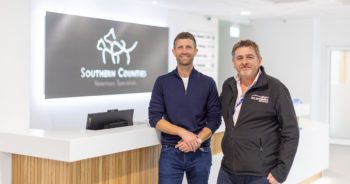2 Feb 2024
Duncan Phillips said regulation of the professions, together with ministerial attitudes towards it, have “simply not kept pace” with the rate of their transformation.

From left: Duncan Phillips, IVC’s UK and Ireland chief executive, with hospital director Stephen Collins at Southern Counties Veterinary Services, which has doubled in size as part of a redevelopment programme.

The UK and Ireland head of the world’s largest veterinary company has called for Government action to tackle the barriers preventing “transformative change” in the sector.
IVC Evidensia’s Duncan Phillips said regulation of the professions, together with ministerial attitudes towards it, have “simply not kept pace” with the rate of their transformation.
In a wide-ranging intervention, he listed priorities for action including increased education funding, a review of the rules on the admission of overseas clinicians and expansion of the veterinary nurse role.
And, while he insisted his company recognised its own responsibilities and pledged to work for change with other organisations, he warned it could not act alone.
He said: “We need the Government to play its part to help address the challenges faced by a vital industry that makes such a positive difference for animal welfare, human health and the UK as a whole.”
Concerns about education funding have been growing in recent months, with vet school bosses and sector group leaders issuing their own warnings about the risks of failing to act.
Mr Phillips said increased investment would recognise the sector’s contribution to wider society and address present challenges that he feels exacerbate its wider recruitment problem.
He said: “While we fund a number of bursaries and scholarships every year in the UK, and highlight the opportunities in our sector to young people across wide economic and diverse backgrounds, as do others in our industry, additional, focused funding from Government would help remove barriers to more choosing to join this amazing profession.”
But he also argued for a wider collaborative effort involving professionals and employers as well as “bold reforms” of the present system.
Although he stressed support for the present RCVS plan to reduce EMS requirements from this autumn, he said proposals for degree apprenticeships and accrediting overseas degrees – an area the college is already examining – should be looked at, too.
He added: “Addressing the challenges in our vital sector demands more ambitious, comprehensive solutions, and a truly collaborative effort involving the Government, the veterinary profession, and employers.
“And it is vital that all aspects of the profession get equal attention and support in this.
“Whether farm, equine, small animal, public health veterinarians, they all protect animal welfare and contribute significantly to the country in multiple ways, including disease surveillance and protection, ensuring food security, supporting human health and well-being, and supporting the economy, directly and indirectly.”
Another area that Mr Phillips identified as contributing to workforce pressures relates to the rules on recruiting overseas vets, particularly after ministers signalled their intention to reduce legal migration routes in December.
Although there have been signs of a recovery in recent times based on RCVS data, he argued that the current system of language testing was “not fit for purpose” and a general assessment would be more appropriate than an academic one because of the level of interactions between clinicians and clients.
He also urged regulatory changes to allow an expanded role for veterinary nurses, adding: “An expanded role would enable a broader team approach, enabling vets to focus on more vet-specific procedures, while improving treatment time availability, and increasing job satisfaction for those vet nurses who would choose to do more.”
Mr Phillips insisted his company was “proud to champion, and invest in, addressing the major challenges confronting the sector.”
However, he also warned: “But to make a truly significant, industry-wide difference, we’re asking Government to help remove some of the barriers to transformative change.”